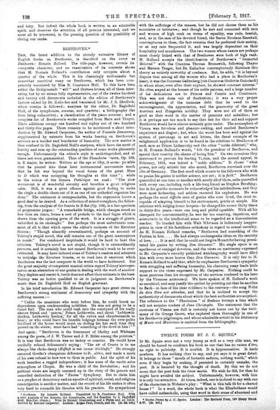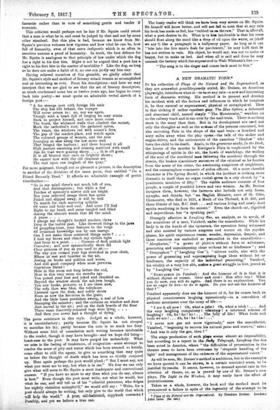TWELVE POEMS BY J. C. SQUIRE.*
IF Mr. Squire were not a very young as well as a very able man, we should bo forced to condemn his book as one that has no raison /tire, no right to publicity. It is morbid. It is hypersensitive. It leads nowhere. It has nothing clear to say, and yet says it in great detail. It belongs to those " moods of fantastic sadness, nothing worth," which even if they begin by making, if persisted in certainly unmake, the poet. It is haunted by the thought of death. By this we do not mean that the poet feels the tinuar mortis. We wish he did, for then hO might have avoided the subjeot. Unfortunately, however, with him it is only too attractive. At times, indeed, one is inolinod to say with one of the characters in Wobster's play : "What is this talk fit for a charnel house ? " In a word, the whole book is what the Elizabethans would have called melancholic, using that word in their sense of abnormal and • Twelve Poems by J. C. Spire. London: The Moriand Press, 190 Ebttry fitted 8.W. Its. net.]
fantastic rather than in ours of something gentle and tender if eccentric.
This criticism would perhaps not be fair if Mr. Squire could retort that a man is what he is, and must be judged by that and not by some other standard. But this plea is bad, because we know from Mr. Squire's previous volumes how vigorous and how vital he can be, how full of humanity, even of that seems indegnetio which is so often in sensitive natures a proof of humanity. In truth, the best defence for Mr. Squire is analogous to that principle of law under which the dog has a right to his first bite. Might it not be argued that s poet has a right to his first bite in the matter of morbidity ? Like the dog, as long as he does not make a habit of it, no one can justly say him nay.
Having relieved ourselves of this grumble, we gladly admit that Mr. Squire's style and method of literary attack remain as accomplished and as interesting as erer. From his descriptions—and here we may interject that wo are glad to see that the art of literary description, so much condemned some ten or twelve years ago, has begun to creep bask into poetry—we must quote an admirable verbal sketch of a foreign port:— "A far strange port with foreign life astir
The ship has left behind, the voyager Will never return to ; no, nor see again, Though with a heart full of longing he may strain Back to project himself, and once more count The boats, the whitened walls that climbed the mount, Mark the cathedral:a roof, the gathered spires, The vanes, the windows rod with sunset's fires, The gap of the market-place, and watch again The coloured groups of women, and the men Lounging at ease along the low stone wall That fringed the harbour ; and there beyond it all High pasture summing and evening scattered with small Spo ks that were grazing sheep. . .. It is all gone, It is all blurred that once so brightly shone; He cannot now with the old clearness see The rest upon one ringbolt of the quay."
Far more poignant, though not so pleasant a picture, is the description in another of the divisions of the same poem, that entitled " On a Friend Recently Dead." It affords an admirable example of poetic visualization :- " So in my mind there's not much left of you, And that disintegrates ; but while a few Patches of memory's mirror still are bright Nor your reflected image there has quite Faded and slipped away, it will be well To search for each surviving syllable Of voice and body and soul. And some I'll find Right to my hand, and some tangled end blind Among the obscure weeds that fill the mind.
A pause . . . I plunge my thought's hooked resolute claws Deep in the turbid past. Like drowned things in the jaws Of grappling-irons, your features to the verge Of censeious knowledge one by one emerge.
Can I not make these scattered things unite ? . .
I knit my brows and clench my eyelids tight And focus to a point. . . . Streams of dark pinkish light Convolve ; and now spasmodically there flit Clear pictures of you as you used to sit :- The way you crossed your legs stretched in your chair, Elbow at rest and tumbler in the air, Jesting on books and polities and worse, And still good company when most perverse.
Capricious friend Here in this room not long before the end, Here in this very room six months ago You poised your foot and joked and chuckled so. Beyond the window shook the ash-tree bough, You saw books, pictures, as I see them now, The sofa then was blue, the telephone Listened upon the desk, and softly shone Even as now the fire-irons in the grate, And the little brass pendulum swung, a seal of fate Stamping the minutes ; and the curtains on window and door Just moved in the air ; and on the dark boards of the floor These same discreetly-coloured rugs were lying. . And then you never had a thought of dying."
The poem continues in this style. Judged as a whole, however, it is unsatisfactory ; partly because Dlr. Squire ha not stooped to moralize his lay, partly because the note is so much too fiery. Without some hint of consolation such writing becomes intolerable to the reader, though it may have brought—and we hope did bring- heart-ease to tho poet. It may halm purged his melancholy. What we miss is the feeling of tenderness, of resignation—some attempt to resolve the sense of pity and terror which has been aroused so keenly, some effort to still tho agony, to give us something that may quiet us before the thought of death which has been so vividly conjured up. Here again perhaps the poet would plead : " But I must say, not what you want me to say, but what is in me." We fear we can only give what will seem to Mr. Squire a most inadequate and conventional answer. " H you have no more to say than what you do say, silence is best." Even though the poet must write, not what he would, but what he can, and will tell us of his " celestial patroness, who deigns her nightly visitation unienploed," we would still say : " Write, for a poet should always be writing, but only give to the world that which will help the world." A poor, okbfashionod, copybook comment ?
Possibly, and yet we believe a trim ono.
The hasty reader will think we have been very severe on Mr. Squire. He himself will know better, and will set fail to note that at any rate his book has made us feel, has " rubbed us ea the raw." That is, after all, what a poet desires to do. What is to him intolerable is that his verse should float along the mind like a drop of oil upon the water, or (shall we say ?) like a paragraph in • halfpenny paper. A,s long as it can " bite into the live man's flesh for parchment," he may hold that hi has not written in vain. His object, he would say, was not to make es happy, but to make us feel. And when all is said and done he may unmask the battery which lies sequestered in Walt Whitman's line :- " The song is to the singer and comes back most to him."







































 Previous page
Previous page